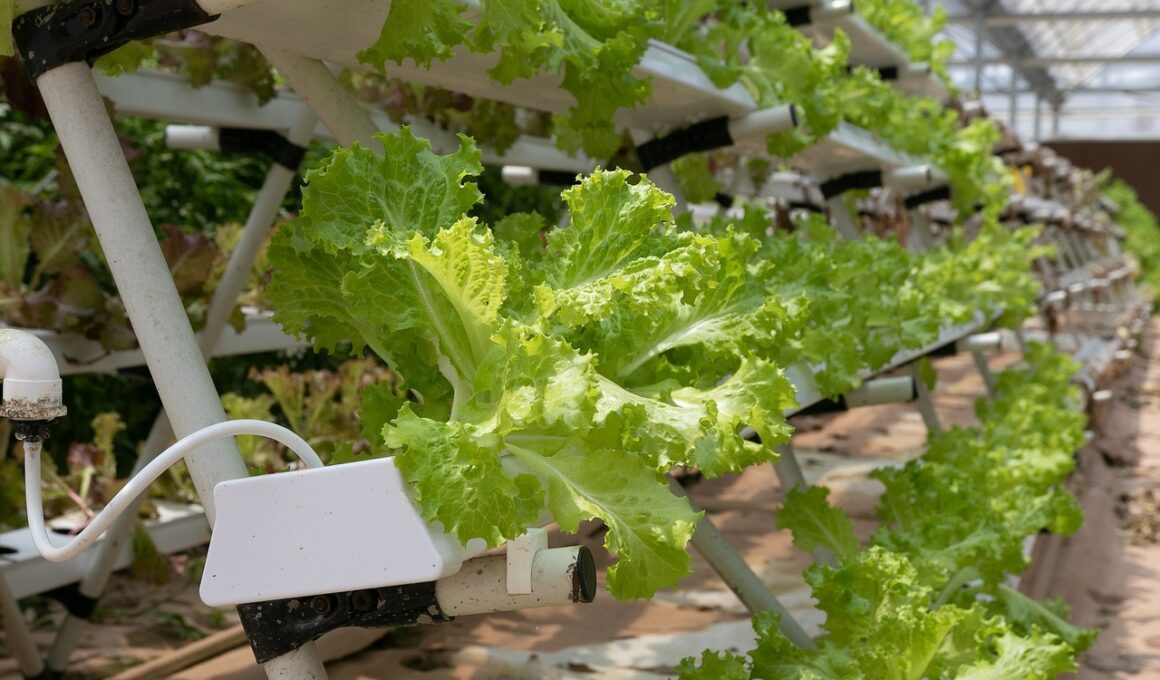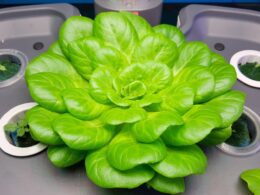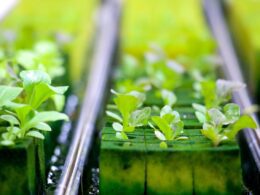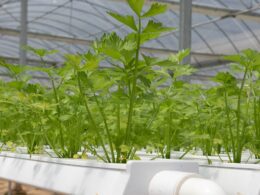Are you considering starting a hydroponic garden but worried about the maintenance required? With the right knowledge and planning, hydroponics can be a relatively low-maintenance gardening method.
Unlike traditional soil-based gardening, hydroponics allows for efficient water and nutrient delivery directly to the plant roots, leading to faster growth and higher yields.
To keep your hydroponic system running smoothly, it’s important to understand the basic components and create a maintenance schedule. In this article, we will guide you through the necessary steps to maintain a healthy hydroponic garden. We’ll also cover common problems and provide tips for preventing issues before they arise.
With this information, you can confidently grow your own fresh produce year-round, knowing that your hydroponic system is easy to maintain.
Understanding the Basic Components of a Hydroponic System
You’re going to love how simple it is to put together and manage the different parts of your hydroponic setup.
First, let’s talk about the basic components of a hydroponic system. You’ll need a reservoir to hold the nutrient solution, a pump to circulate the solution, and a growing tray to hold your plants. Additionally, you’ll need some growing medium, like perlite or rockwool, to support your plants.
Once you have your hydroponic system setup, the next step is nutrient solution management. This involves regularly checking the pH level and nutrient levels of your solution to ensure your plants are getting the right nutrients.
You can use a pH meter or test strips to check the pH level, and a TDS meter to check the nutrient levels. It’s important to adjust these levels as needed to keep your plants healthy.
Maintaining a hydroponic system is easy as long as you stay on top of nutrient solution management. With a little bit of effort and attention, you can have a thriving hydroponic garden in no time.
So don’t be intimidated by the idea of setting up and maintaining a hydroponic system – it’s a fun and rewarding way to grow your own fresh produce at home.
Creating a Maintenance Schedule
Make sure to set up a regular schedule for maintaining your hydroponic system, as this will ensure the health and productivity of your plants. The frequency of maintenance will depend on the type of system you have, but as a general rule, you should inspect your system at least once a week.
During these inspections, check for any signs of damage, such as leaks or clogs, and make sure that all the components are working as they should be. If you notice any problems, address them immediately to prevent them from becoming more serious.
Another important aspect of maintenance is record keeping. Keeping a log of when you perform maintenance tasks, such as replacing nutrient solutions or cleaning filters, can help you identify patterns and potential problems. This can also help you keep track of when you need to order new supplies, so you never run out of anything you need to keep your system running smoothly.
Remember to keep your log up to date and easily accessible, so you can refer to it whenever you need to.
In order to keep your hydroponic system functioning at peak performance, it’s essential to follow a regular maintenance schedule and keep accurate records. By doing so, you can catch any issues early on and prevent them from becoming more serious. With a little effort, you’ll be able to enjoy a thriving and healthy hydroponic garden for years to come.
What is the Recommended Size for a Hydroponic Reservoir?
Determining the ideal hydroponic reservoir size is crucial for successful cultivation. It depends on various factors such as the number of plants, their size, and environmental conditions. Proper sizing ensures ample nutrient availability while preventing stagnant water or excessive evaporation. Regular calculations and monitoring are essential to maintain optimal hydroponic reservoir size for efficient plant growth.
Troubleshooting Common Problems
If you’re experiencing issues with your hydroponic system, don’t worry – troubleshooting common problems can be simple and straightforward. One of the most common problems is pest management. Pests can easily invade your hydroponic garden, especially if you’re growing without soil. To prevent this, make sure to keep your hydroponic system clean and practice good hygiene. You can also use natural pest control methods such as neem oil or insecticidal soap.
Another common problem is nutrient deficiency. Because hydroponics relies heavily on nutrient solutions, it’s important to make sure your plants are getting all the nutrients they need. Check the nutrient solution regularly and adjust it as needed. You can also add supplements to the solution to make sure your plants are getting all the necessary nutrients. Remember to follow the instructions carefully, as adding too much of a supplement can be just as harmful as a nutrient deficiency.
In order to maintain a healthy hydroponic system, it’s important to address problems as soon as they arise. Keep an eye on your plants and check for any signs of pests or nutrient deficiencies. By practicing good pest management and nutrient monitoring, you can ensure your hydroponic garden is healthy and thriving. With a little bit of effort, maintaining your hydroponic system can be easy and rewarding.
Tips for Preventing Issues
To keep your plants healthy and avoid potential problems, there are several preventative measures and maintenance techniques you can take in your hydroponic garden.
First, ensure that your nutrient solution is properly mixed and balanced according to the needs of your plants. You can use a pH meter and a TDS meter to monitor the acidity and nutrient levels in your solution. It’s also important to clean and sanitize your system regularly to prevent the buildup of algae, bacteria, and other harmful pathogens.
Secondly, maintain proper lighting and temperature levels in your hydroponic garden. Different plants have different light and temperature requirements, so make sure you research the optimal conditions for the plants you’re growing. Consistent lighting and temperature levels will help your plants grow strong and healthy. You can use a timer to ensure that your plants receive the appropriate amount of light each day.
Finally, keep a close eye on your plants and monitor them for any signs of stress or disease. Catching problems early can prevent them from spreading and causing serious damage to your plants. Regularly inspect your plants for pests, wilting, yellowing leaves, and other signs of distress. If you do notice any issues, take action quickly to address them before they become more serious.
By taking these preventative measures and maintenance techniques, you can keep your hydroponic garden healthy and thriving. With a little attention and care, you can enjoy a bountiful harvest of fresh, delicious produce. Remember to stay vigilant and proactive in your approach to hydroponic gardening, and you’ll be rewarded with a successful and fulfilling growing experience.
Hiring a Professional Maintenance Service
Consider hiring a professional maintenance service to keep your hydroponic garden healthy and thriving without the stress of managing it all on your own. While DIY maintenance can be a cost-effective alternative, it can also be time-consuming and challenging.
A professional service can provide expert care and attention to your hydroponic system, ensuring that it runs smoothly and efficiently. One of the benefits of DIY maintenance is that it allows you to have complete control over your hydroponic garden. However, it can also be overwhelming, especially if you’re new to hydroponics.
A professional maintenance service can take care of the technical aspects of your system, such as adjusting the nutrient solution, pH levels, and lighting schedule, while you focus on enjoying your garden. Moreover, a professional maintenance service can save you money in the long run.
They can identify and address potential issues before they become major problems, which can lead to expensive repairs or replacements. Additionally, they can provide advice on how to optimize your hydroponic garden and improve its performance.
Hiring a professional maintenance service can give you peace of mind and allow you to enjoy the benefits of hydroponics without the stress of managing it all on your own.
Frequently Asked Questions
How much water is needed to maintain a hydroponic system?
Maintaining a hydroponic system requires careful attention to water requirements and nutrient management. The amount of water needed can vary depending on the size of the system and the types of plants being grown. However, generally speaking, hydroponic systems use less water than traditional soil-based gardening methods.
It’s important to monitor the water levels regularly and adjust accordingly to prevent over or under watering. Nutrient management is also crucial in maintaining a healthy hydroponic system. The plants rely on a nutrient solution to grow, so it’s important to make sure the solution is properly balanced and replenished as needed.
With careful attention to water and nutrient management, maintaining a hydroponic system can be a relatively easy and rewarding experience.
Can hydroponic plants be grown without using chemicals?
Yes, it’s possible to grow hydroponic plants without using chemicals. Organic hydroponics utilizes alternative fertilizers such as compost tea, fish emulsion, and seaweed extract to nourish plants.
These natural fertilizers provide essential nutrients without the use of harmful chemicals, making them safe for both you and the environment. Maintaining an organic hydroponic system requires a bit more attention than traditional methods, but it’s a rewarding and sustainable way to grow plants.
By avoiding synthetic fertilizers and pesticides, you can ensure that your plants are healthy and free from harmful chemicals. So go ahead and give organic hydroponics a try – your plants and the planet will thank you!
What kind of lighting is best for a hydroponic setup?
When it comes to setting up a hydroponic garden, choosing the right lighting is crucial. The two most popular options are LED and fluorescent lighting. LED lights are more energy-efficient and emit less heat, but can be more expensive upfront.
Fluorescent lights, on the other hand, are cheaper but use more energy and generate more heat. Regardless of which option you choose, it’s essential to select a light spectrum that is best for your plants’ growth.
Blue light is ideal for promoting vegetative growth, while red light is better for flowering and fruiting stages. By selecting the right lighting for your hydroponic setup, you can ensure your plants thrive and produce abundant yields.
How often should nutrient solutions be changed in a hydroponic system?
Maintaining a hydroponic system requires attention to the frequency of flushing and the nutrient solution composition. Flushing refers to the process of replacing the nutrient solution in the system, which should be done every two to three weeks to prevent the buildup of salts and other impurities.
The composition of the nutrient solution should also be monitored regularly to ensure that the plants are receiving the right balance of nutrients. While hydroponics can be a low maintenance option for growing plants, it does require some effort to maintain optimal conditions for plant growth.
However, with proper care and attention, hydroponic systems can produce healthy and abundant crops.
Can hydroponic systems be used in outdoor environments?
Looking for a way to grow plants in an outdoor environment? Hydroponic systems are a great choice!
With outdoor hydroponic advantages like more sunlight and fresh air, you can grow your plants faster and healthier than ever before.
When it comes to hydroponic system placement, you’ll want to choose a location that’s sheltered from extreme weather conditions, but still gets plenty of sunlight.
Plus, with the ease of maintenance that comes with hydroponics, you can spend less time worrying about your plants and more time enjoying the fruits of your labor.
So why not give outdoor hydroponics a try? Your plants will thank you!
Conclusion
So, is hydroponics easy to maintain? The answer is both yes and no.
On one hand, the basic components of a hydroponic system are easy to understand and maintain. However, it does require a certain level of dedication and attention to detail to keep everything running smoothly.
To ensure that your hydroponic system stays healthy and productive, it’s important to create a maintenance schedule and stick to it. This includes regular cleaning, checking nutrient levels, and monitoring for any signs of pests or disease. By being proactive and taking preventative measures, you can avoid many common issues that can arise in hydroponic systems.
If you’re unsure about how to maintain your hydroponic system, or simply don’t have the time or resources to do so, it may be worth considering hiring a professional maintenance service. They can provide expert advice and assistance to ensure that your system is functioning at its best.
Overall, while hydroponics does require some effort to maintain, the benefits of growing your own fresh and healthy produce make it well worth it in the end.








